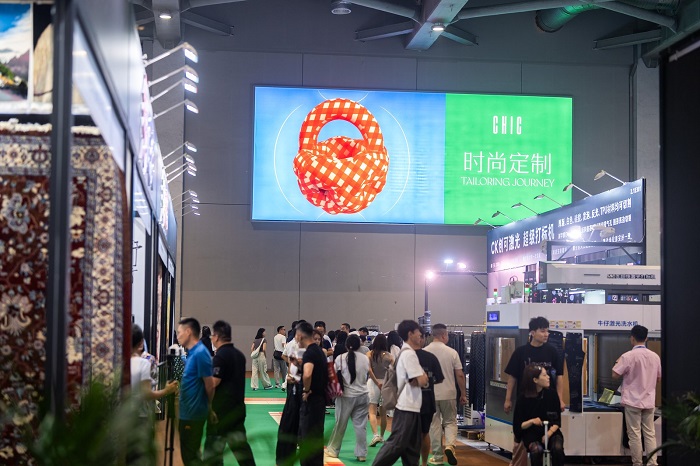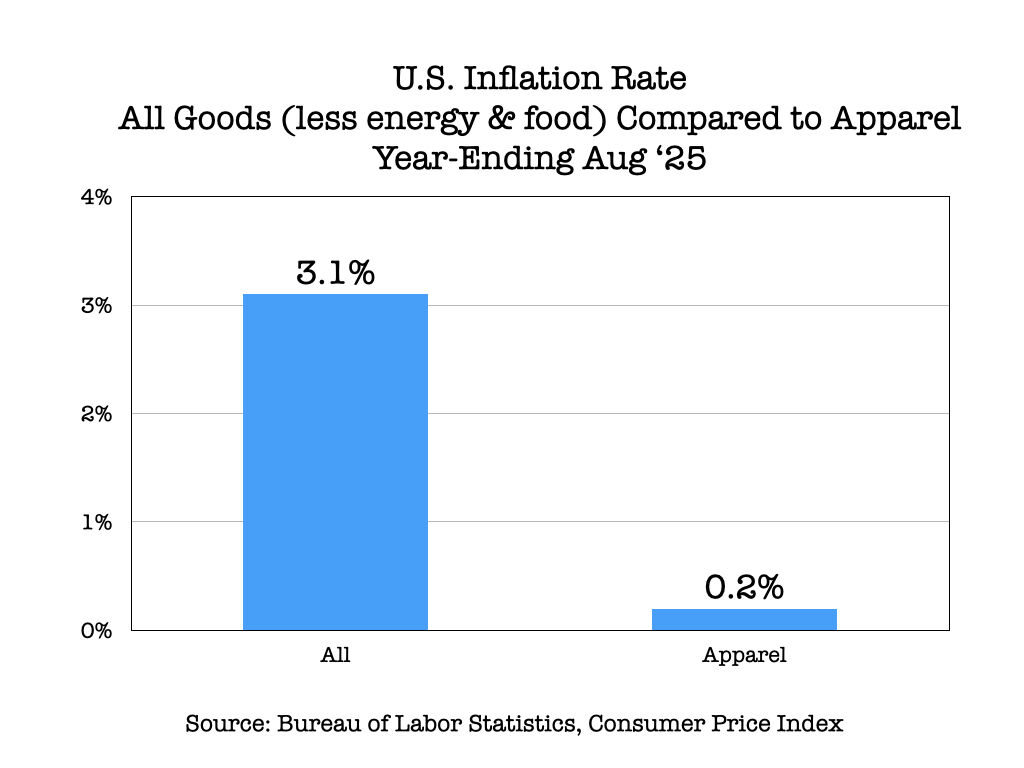FW
Japan’s Fast Retailing owners of Uniqlo, posted a 35 per cent rise in second-quarter operating profit and upgraded its full year forecast by 13 per cent as overseas sales took the lead in driving growth.
Operating profit at Asia’s biggest clothing retailer was around 56.6 billion yen ($529.47 million) in the quarter ended February. This was above a consensus estimate of 49.1 billion yen from eight analysts polled by Thomson Reuters I/B/E/S.
Forecasters see profit hitting 221.4 billion yen. Fast Retailing upgraded its full-year operating profit forecast to 225 billion yen from 200 billion yen earlier.
Eastman has over time become synonymous with cutting rooms of apparel manufacturing units in Southeast Asia. Time and again, the company has proven its expertise and importance to cutting rooms in apparel factories across China, India and Bangladesh.
Eastman is a manufacturer of cutting room solutions for the apparel and other sewn products industry. With saving on waste becoming the prime focus for many garment manufacturers today, cutting solutions that are effective have gained importance.
Moving forward toward growth and increasing its market share, Eastman’s next destination is Vietnam. The country’s apparel industry, in recent years, has grown significantly, with its trained workforce and politically stable environment, which has encouraged a number of foreign companies to establish and expand their production in Vietnam.
And to penetrate the Vietnam market, Eastman is mulling setting up its liaison office in the country. It already has liaison offices in India and Bangladesh. In 2004, the company opened a manufacturing facility in China. Industry 4.0 solutions are a requirement for big factories, but there are a number of small factories which do not need these solutions. Eastman understands customers’ needs and provides them the right machine at a fair price.
ITMA 2019 will be held in Spain from June 20 to 26. The cluster of accompanying events will spotlight on key industry challenges and leading-edge solutions that will support industry members’ drive for sustainability and competitiveness. It will feature a number of industry-leading knowledge-sharing events to facilitate sharing and collaboration among global textile and garment industry members. Hot button issues such as sustainable innovation, Industry 4.0 and automation will be on the agenda.
ITMA has evolved beyond its original aim of merely providing a buy-and-sell platform for textile machinery manufacturers. It is now a meaningful platform for all industry stakeholders to share new breakthroughs, brainstorm solutions and explore collaboration.
The Textile Colorant and Chemical Leaders Forum will focus on circular economy. Discussions will center on circular economy and resource sustainability strategy and how textile chemicals and innovative and cleaner technologies can support it under the influence of Industry 4.0’s emerging strategic concept.
Following a successful collaboration in 2015, ITMA will jointly organise the Nonwovens Forum at ITMA 2019 with International Association for the Nonwovens and Related Industries. The event will feature discussions on the latest innovations in nonwovens, nonwovens manufacturing processes for the 21st century.
Italian company RadiciGroup promotes efforts and investments devoted to measuring sustainability in fashion. The company aims to raise awareness among designers and fashion operators on the importance of backing sustainability strategies with sound, impartial data.
RadiciGroup specializes in chemicals, plastics, synthetic fibers and nonwovens. RadiciGroup believes measuring sustainability is a profitable investment in the medium and long term and the key precondition for creating a truly sustainable production chain in the light of circular economy and eco-design.
Universally recognised measurement instruments, such as life-cycle assessment (LCA), can offer any kind of organisation a valuable tool to assess environmental impacts. Various degrees of deepening are possible, suitable to small, medium and big-sized companies, along with the possibility, which is not an obligation, of third party certification.
Data are fundamental to get an overview of impacts, to spot high-impact processes on which to invest, to compare various types of fibers, to back sustainable claims with data, not with impressions or beliefs. Life-cycle assessment is a technique to assess environmental impacts associated with all the stages of a product’s life from raw material extraction through materials processing, manufacture, distribution, use, repair and maintenance, and disposal or recycling. Designers use this process to help critique their products.
Invista has launched a new version of its popular Lycra T400 fiber. This has enhanced sustainability. Lycra T400 fiber with Eco Made technology is made from a combination of recycled materials, such as pet bottles diverted from landfills and renewable plant-based materials. It can be paired with sustainable rigid fiber offerings such as BCI cotton, Tencel lyocell etc, so brands and retailers can amplify their eco-friendly message to consumers.
This innovation will appeal to members of the apparel value chain interested in developing more sustainable denim and woven collections. The original Lycra T400 fiber is the building block for a number of the brand’s popular stretch denim concepts including Lycra dualFX, Lycra Xfit and Lycra Tough Max technologies. Lycra T400 Eco Made fiber has been developed to offer the same benefits of lasting comfort, fit and performance as the original, but with the value-added offer of sustainability.
Invista owns brand Lycra which is one of the world’s largest integrated producers of polymers and fibers. Invista has done a study on bi-stretch that can help brands and retailers choose the best bi-stretch fabrics for their particular needs. This new tool can help guide fabric selection by illustrating the relative merits of different ways of achieving bi-stretch denim.
GOTS India Seminar 2018 will be held in Coimbatore on May 29. Stakeholders and actors from organic textile supply chains will come together to discuss various initiatives to achieve business efficiency through sustainable practices. Advances in textile process innovations can lead to sustainable development while at the same time improve efficiencies and enhance profits. Through focused and challenging discussions, this one-day seminar will address pressing issues relevant to the organic textile industry. It will equip delegates with best practices and knowhow relating to the biggest opportunities – and challenges – while transforming their supply chains to achieve efficiency through sustainability.
Key issues which will feature are sustainability in the fashion industry, current trends in eco-fashion, priorities of buyers, chemical and environmental compliance, trends in environmental compliances, future of compliances and standards.
As consumers become increasingly aware of the environmental cost of fast fashion, 2018 is predicted to be the year when sustainability goes mainstream. GOTS has been organising international and regional events since 2015. GOTS India Seminar 2018 is the third event in India organized by the organisation. Earlier events were in Mumbai and New Delhi.
GOTS (Global Organic Textile Standard) is the stringent voluntary global standard for the entire postharvest processing (including spinning, knitting, weaving, dyeing and manufacturing) of apparel and home textiles made with certified organic fiber (such as organic cotton and organic wool) and includes both environmental and social criteria.
India and the European Union are trying to re-start the Free Trade Agreement negotiations. The discussions, formally called the Broad-based Trade and Investment Agreement (BTIA), were officially kicked off in 2007 but saw several ups and downs with disagreements over market access issues.
In 2013, they reached a complete standstill as the EU was unhappy with India’s offers for items such as wines and spirits and automobiles as well as financial services and retail. India, on its part, wanted more market access for key manufacturing items, grant of data secure status that would bring more off-shore business to its companies and greater flexibility in H1-B visa rules.
However, this time things could be different. The EU, and to some extent India, have been on the receiving side of the abrasive trade measures of the US. Hard positions may see some softening. The Indian industry, especially textiles and garments sector, is eager to formalise the BTIA with the EU soon as competitors like Bangladesh and Vietnam enjoy preferential tariffs in the region. Two-way trade between India and the EU is well balanced. The EU accounts for about 17 per cent of India’s total exports.
Planet Textiles will be held in Canada on May 22. The event will focus on deforestation where key industry figures look at the challenges facing the man-made cellulosic textile sector in terms of forestry management, climate change and biodiversity.
The major aim of the event is to share new environmental innovations and business models, and to show how new technologies and financial innovations can increase collaboration and transparency in the industry. Sessions will be conducted on financial models and mechanisms, real-world examples and original case studies of textile companies that have already managed to scale up sustainability, how they have successfully applied new investment to grow and what true investment costs actually look like.
Canada is home to 10 per cent of the world’s forested land. Over 120 million trees a year are logged for use in clothing made from fibers such as viscose and lyocell. Many of these garments are made from wood sourced in endangered forests, creating a huge threat to critical eco-systems, habitats and planetary biodiversity.
One of the main aims of the event is to provide actionable ideas that can be taken and implemented within respective companies. This will include what the next steps should be and how brands can tackle this issue more effectively by selecting the right partners.
Cotton made in Africa (CmiA) was founded in 2005 as a social business to protect the environment and support smallholder farmers and their families in sub-Saharan Africa. Cotton made in Africa cooperates with more than one million cotton farmers, 17 per cent of whom are women. Besides farmers, more than 11,000 factory workers in the African cotton processing industry are part of the initiative.
The label for sustainable cotton stands for environmental protection and training in sustainable and modern cotton cultivation. The training enables smallholder farmers to improve their working and living conditions through their own efforts. In addition, CmiA certifies the work in ginneries, the first step in the processing of cotton. In 2017 a record 90 million textiles, bore the CmiA label. This is a 79 per cent increase compared to previous year.
For each textile wearing the CmiA certificate, a license fee flows back into the project areas. Instead of transferring donations, the initiative has thus chosen a market approach. A total of 36 companies and brands currently order CmiA cotton. Smaller fair fashion brands also use CmiA certified cotton to set an example in the industry.
The digital textile printing market is expected to grow at a CAGR of 5.59 per cent between 2018 and 2023. Growing demand for sustainable printing, increasing demand for digital textile printing in the garment and advertising industries, shortening lifespan and faster adaptability of fashion designs, development of new technologies in the textile industry, reduced per unit cost of printing with digital printers and growth of the e-commerce industry are the major factors driving the market.
The global digital textile printing market for roll to roll printing process held the largest share in 2017. More than 70 per cent of the total digital textile printing market was dominated by the roll to roll printing process. Roll to roll digital printers are majorly used in textile and decor, soft signage, and industrial applications. The major applications in textile and decor are home textile, upholstery, linens, drapery, ties, sportswear, footwear, clothes, interior decor etc.
The market for direct to garment application is expected to grow significantly during the forecast period. Fast moving fashion cycles, cost advantage on short run cycles, creative designs, quick time to market for new trends, reduced waste, and low power consumption are some of the major factors to drive the market for direct to garment applications.












